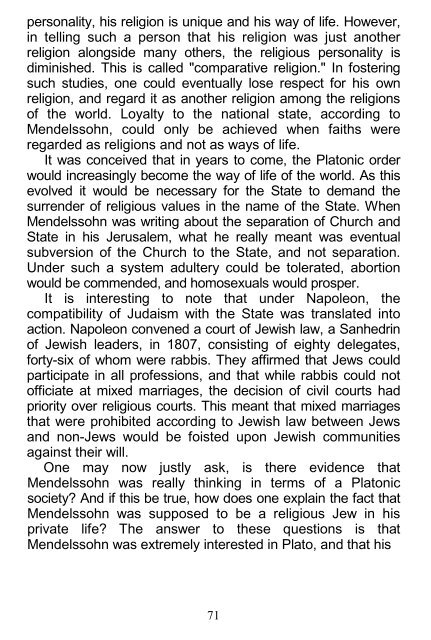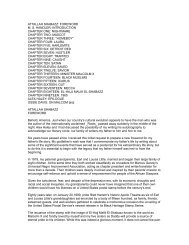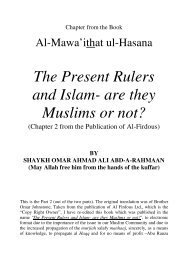Create successful ePaper yourself
Turn your PDF publications into a flip-book with our unique Google optimized e-Paper software.
personality, his religion is unique and his way of life. However,<br />
in telling such a person that his religion was just ano<strong>the</strong>r<br />
religion alongside many o<strong>the</strong>rs, <strong>the</strong> religious personality is<br />
diminished. This is called "comparative religion." In fostering<br />
such studies, one could eventually lose respect for his own<br />
religion, and regard it as ano<strong>the</strong>r religion among <strong>the</strong> religions<br />
of <strong>the</strong> world. Loyalty <strong>to</strong> <strong>the</strong> national state, according <strong>to</strong><br />
Mendelssohn, could only be achieved when faiths were<br />
regarded as religions and not as ways of life.<br />
It was conceived that in years <strong>to</strong> come, <strong>the</strong> Pla<strong>to</strong>nic order<br />
would increasingly become <strong>the</strong> way of life of <strong>the</strong> world. As this<br />
evolved it would be necessary for <strong>the</strong> State <strong>to</strong> demand <strong>the</strong><br />
surrender of religious values in <strong>the</strong> name of <strong>the</strong> State. When<br />
Mendelssohn was writing about <strong>the</strong> separation of Church and<br />
State in his Jerusalem, what he really meant was eventual<br />
subversion of <strong>the</strong> Church <strong>to</strong> <strong>the</strong> State, and not separation.<br />
Under such a system adultery could be <strong>to</strong>lerated, abortion<br />
would be commended, and homosexuals would prosper.<br />
It is interesting <strong>to</strong> note that under Napoleon, <strong>the</strong><br />
compatibility of Judaism with <strong>the</strong> State was translated in<strong>to</strong><br />
action. Napoleon convened a court of Jewish law, a Sanhedrin<br />
of Jewish leaders, in 1807, consisting of eighty delegates,<br />
forty-six of whom were rabbis. They affirmed that Jews could<br />
participate in all professions, and that while rabbis could not<br />
officiate at mixed marriages, <strong>the</strong> decision of civil courts had<br />
priority over religious courts. This meant that mixed marriages<br />
that were prohibited according <strong>to</strong> Jewish law between Jews<br />
and non-Jews would be foisted upon Jewish communities<br />
against <strong>the</strong>ir will.<br />
One may now justly ask, is <strong>the</strong>re evidence that<br />
Mendelssohn was really thinking in terms of a Pla<strong>to</strong>nic<br />
society? And if this be true, how does one explain <strong>the</strong> fact that<br />
Mendelssohn was supposed <strong>to</strong> be a religious Jew in his<br />
private life? The answer <strong>to</strong> <strong>the</strong>se questions is that<br />
Mendelssohn was extremely interested in Pla<strong>to</strong>, and that his<br />
71




